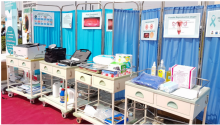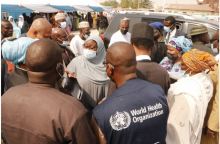Niger state government begins cervical cancer services in line with WHO’s recommendation
Minna, 20 January 2022 - In line with the World Health Organization's (WHO) recommendation for screening and treatment to prevent cervical cancer, the Niger State Government has begun screening women for Human Papillomavirus (HPV) and cancer prevention services in nine Local Government Areas (LGA).
The pilot scheme, which will be in phases, targets about 5,000 women in Chanchaga, Paikoro, Suleja, Bosso, Gbako, Borgu, Kontagora, Lapai and Mokwa LGA.
The exercise aims to reduce the prevalence of cancer in Niger State.
During the flag-off ceremony held on 10 January 2022 at Jummai Babangida Aliyu Maternal and Neonatal Hospital in Minna by the State Governor, Alhaji (Dr.) Abubakar Sani Bello said the government is aware of the disturbing cancer situation and is determined to meet the 90-70-90 World Health Organization (WHO) cancer elimination strategy.
“For the State to achieve an accelerated reduction in morbidity and mortality associated with cervical cancer, one of the commonest malignancies among women of reproductive age, the quality of care provided to these categories of women should be readily accessible and free”, he said.
Appreciating WHO and partners support in the fight against Cervical Cancer, he said “we are working with WHO and partners to expand the HPV Cervical Cancer Prevention Services to at least one health facility per ward”.
He also pledged that the state government would endeavor to provide quality health services available to her people.
Speaking during the ceremony, the wife of the governor Dr Amina Abubakar Bello, in her keynote address, said most cancer cases are detected late and which contributes to the high mortality rate.
She said that in Nigeria, an estimated 36.59 million women above 15 year of age are at risk of developing the disease.
“The annual incidence and mortality are approximately 570,000 and 311,000 respectively. Unfortunately, about 80% of this number occur in the low-and-middle-income countries including Nigeria”
“This strategy rests on three main pillars: Prevention through vaccination, screening and treatment of precancerous lesions, treatment and palliative care for invasive cervical cancer”.
Meanwhile, Dr Bello has been collaborating with WHO using her foundation, Raise Foundation, to spearhead the campaign to improve awareness and treatment of breast and cervical cancers – the most common cancers amongst women in Nigeria.
Consequently, working through her foundation in close partnership with the State Ministry of Health, WHO and Clinton Health Access Initiative (CHAI), will be providing free screening and testing for 5000 eligible women in the first phase of the laudable project.
Representing the WHO Country Representative at the event, Dr Opeyemi Emmanuel, WHO (Surveillance Officer), said the period was particularly instructive as it coincided with the global Cervical Cancer awareness month.
“Cervical cancer can be eliminated in our lifetime, if we implement the various interventions to achieve the 90-70-90 targets. WHO’s support is meant to catalyze implementation in the states, we work with the states to ensure sustainability beyond the initial phase”
“I will urge the media to sensitize the women/girls to get informed, screened and vaccinated against the disease. Cervical cancer is highly preventable, treated and curable if detected early, this could be done at primary and secondary health facilities, he said.
The WR further pledged WHO’s commitment to continue providing technical assistance to Niger State in delivering high-quality HPV Cervical Cancer Prevention Services.
Effective primary (HPV vaccination) and secondary prevention approaches (screening for, and treating precancerous lesions) will prevent most cervical cancer cases.
In Nigeria, over 12,000 cases are detected annually and almost 8000 deaths reported annually (Globocon 2020 estimates).
WHO Nigeria working with partners, including CHAI and Federal Ministry of Health, is leveraging on the political will generated by the launch of the WHO cervical cancer elimination strategy in November 2021, to encourage government-led implementation of cervical cancer screening and treatment services in the states. This is also being implemented in Kebbi state and more states to follow in 2022. WHO supported Kebbi and Niger state with trainings, program management and provision of basic equipment for the pilot.
The WHO’s global strategy for cervical cancer elimination– endorsed by the World Health Assembly in 2020 – calls for 70% of women globally to be screened regularly for cervical disease with a high-performance test and for 90% of those needing it to receive appropriate treatment. Alongside the vaccination of girls against the human papillomavirus (HPV), implementing this global strategy could prevent more than 62 million deaths from cervical cancer in the next 100 years.
Technical Contacts:
Dr Olumuyiwa Ojo; Email: ojool [at] who.int (ojool[at]who[dot]int)
Dr Ibrahim Sani; Emai: ibrahimsan [at] who.int (ibrahimsan[at]who[dot]int)


